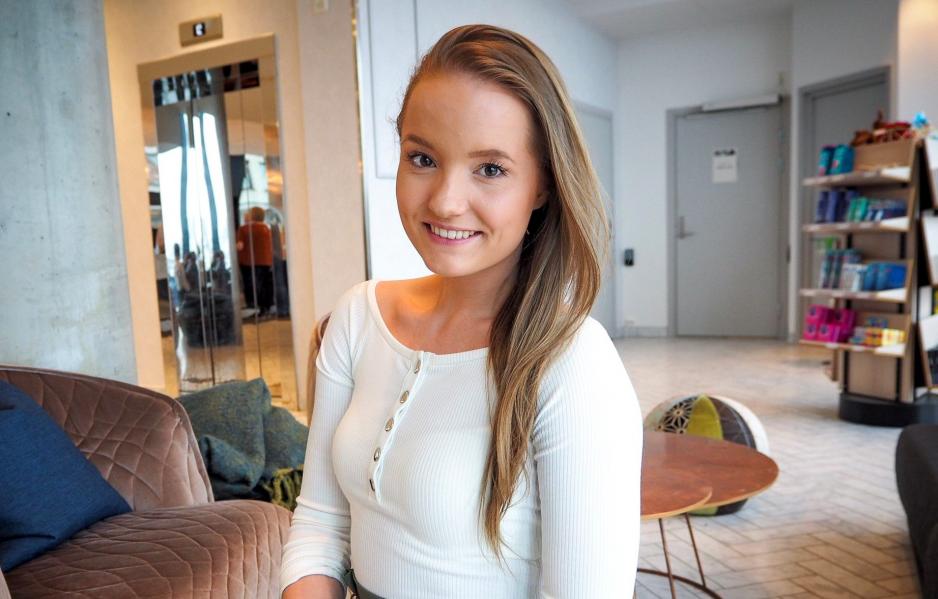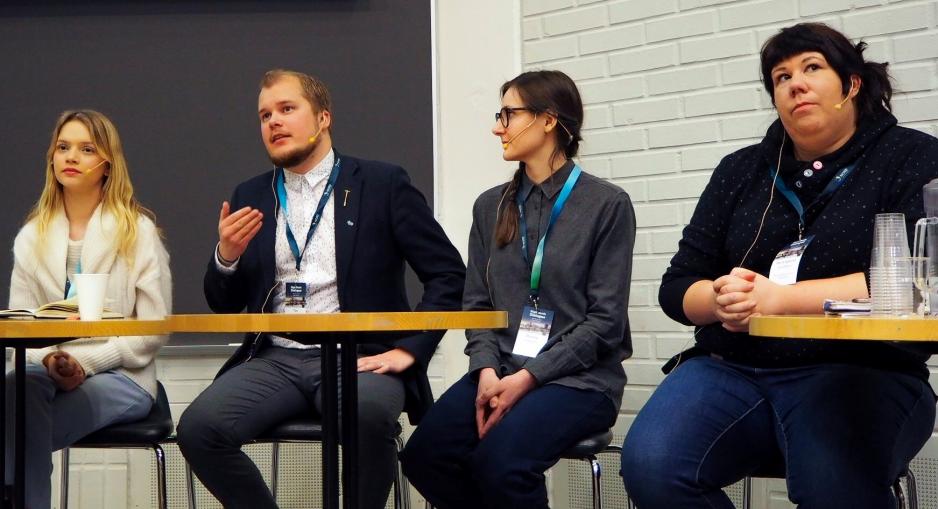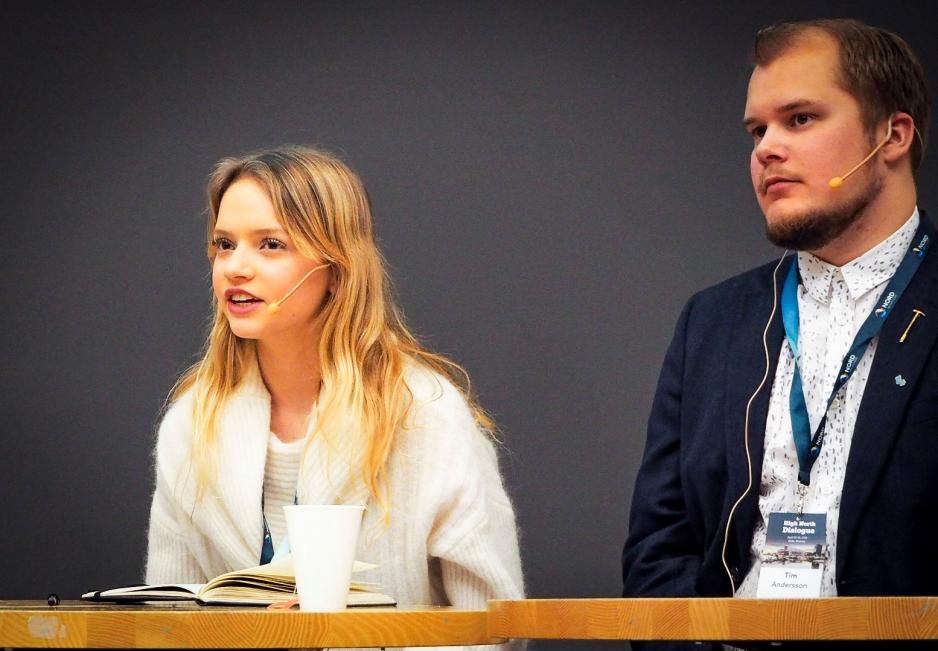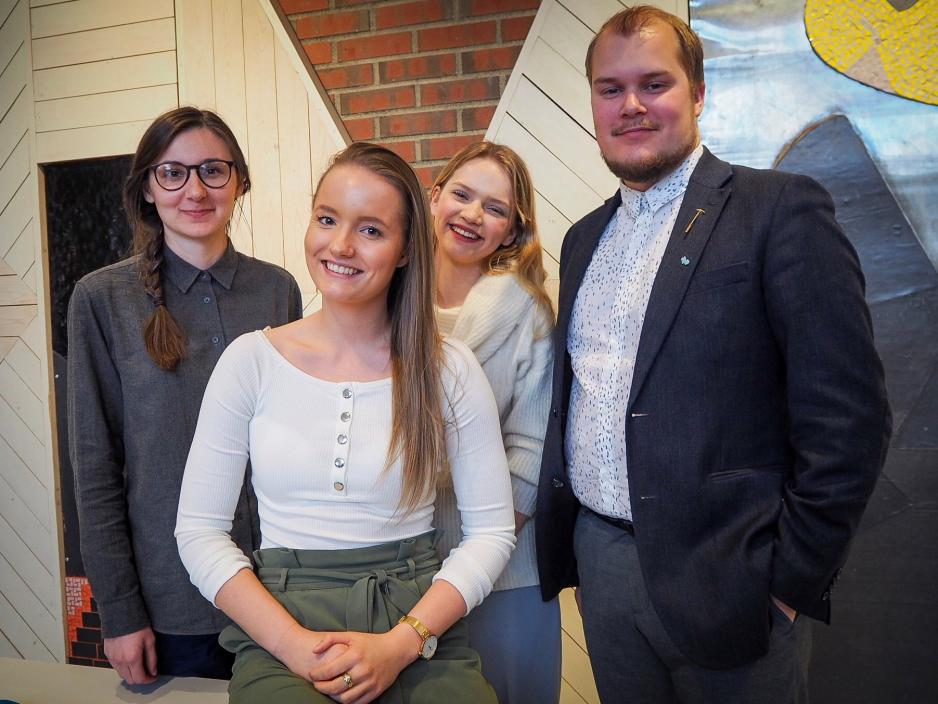- We Should Promote How Cool It Is To Live in the Arctic

It is important to promote the positive aspects of living in the High North and make the abundant opportunities visible to people who are about to make major life choices for their future. In that way, people are more likely to stay or return to the Arctic, argues Amanda Åsberg, Communications Advisor at the Barents Secretariat.
- We must keep a positive mind, promote opportunities, and companies need to meet with young people before they leave, says Amanda Åsberg, moderator at last week’s High North Dialogue and Communications Advisor at the Barents Secretariat.
The conclusion came from the youngest panel during this year’s High North Dialogue; Zhanna Guzenko (27, Murmansk, Russia), Director of Friday Milk, Aleksandra Seljeseth (17, Tromsø, Norway) of the Labour Youth Party, Tim Andersson (24, Kiruna, Sweden) of the Barents Press, Amanda Åsberg (22, Brønnøysund, Norway), of the Barents Secretariat and Marit Egholm Jacobsen (35, Rælingen, Norway) of the Barents Secretariat.
- Companies should meet young people to let them know about the opportunities that exist in the High North. We should speak about the many opportunities we have, because they really abound. Businesses should start recruiting when people are in their upper secondary education, maybe even earlier, says Åsberg.
It is all about sowing an idea, about letting young people get first-hand knowledge of the opportunities that exist in the Arctic before the choose to go away to broaden their horizon and experience something new. If they do not know about the opportunities before they go away, they are not likely to come back or make choices informed by them.
- There is a bigger chance of someone making the choice to return to an job or an opportunity that they know exists. We must get better at promoting ourselves, telling of what we have that is positive and attractive, Åsberg says.

- We must not be forgotten
The Arctic is somewhere on the agenda, ‘on top of the world’. Yet it is easy to forget the younger generations, those who are to take over one day, to assume leadership in business and public management, and manage the resources.
- It is important that we do not forget the young people of the Arctic. And it is important to communicate that we live in a region that is growing and increasing its significance in more ways than one. We must engage in this debate in a way that inspires and engages young people and makes them pay attention to it. We are the ones who are to remain here and we are growing increasingly picky. We want to be on top of the world; not just geographically, but mentally too. The Arctic should be constructed as a cool place for us, Seljeseth says.
The young politician is ambitious in her thinking and argues that it is important to dare to be that.
- We have every opportunity to become a world metropolis for a society that is developing, however, we have to bring the message about the opportunities out there – to let the world know what we are good at, so that it becomes common knowledge for everyone, including my own generation, the 17-year old says.
She believes it is healthy for the mind to go away, travel abroad and get some new perspectives.
- It is definitely possible to bring people back home again eventually, even though it is hard. That is why we have to start promoting and highlighting opportunities at an early stage, before people go away. The fact that we are not good enough ambassadors for the Arctic is a key problem. People believe that you have to go away to live your dream, Seljeseth says.

Culture is a carrying element
Young people need attractive culture around them; cultural offers, conserts, cafes, and meeting places. Important elements to remember in keeping young people in the North, or making them return home again.
- Having vibrant regions is vital for the Arctic. It must be possible to go away to get an education, such as through exchange programmes, and then return as a resource. The opportunities are there, but they are not promoted and are invisible to people in general. We need to push these to the forefront. When I talk with friends, they emphasize education, but also the security that lies in knowing you can land an attractive job and of course live in a place you find personally rewarding, where there is lots of cultural offers to explore. A place where you can settle down, establish a family and enjoy life, Seljeseth says.
- Culture is important. If you enjoy life in the place where you are born and raised, it makes choosing to stay easier. Going to a café, to concerts and other events is essential for young people. That is why universities are important. The younger generation values education, and when cities shrink, young people will contribute to making it vibrant again, says Guzenko, who argues that educational institutions are key bases for population growth in the Arctic.
- Cultur is the basis of life, she says.

Leave the surplus in the region
Tim Andersson of the Barents Press argues that there are also bigger, political steps that need to be taken in order to turn the negative out-migration trend in Northern Sweden.
- We must create opportunities and better infrastructure in order to develope business. In Sweden, there is currently an ongoing debate about all the companies that have left the North. The problem, as I see it, is that major companies like LKAB in Kiruna pay their taxes to Stockholm or Luleå, where their headquarters lie, while the local communities in Kiruna or Gällivare only derive the income taxes from workers. If the companies had left more of the share to the local communities where they actually operate, it would have been possible to invest in innovation, Andersson says.
He says that Kiruna, his home town, is a very particular place with both mining and rocket launches into space.
- Yet there is not one young person who feels that it is an exciting place to be. The fact that money flows to Stockholm affects the young. If Kiruna had profited more from the businesses that the town hosts, there would be greater opportunities for development, Andersson says.
Les artikkelen på norsk
